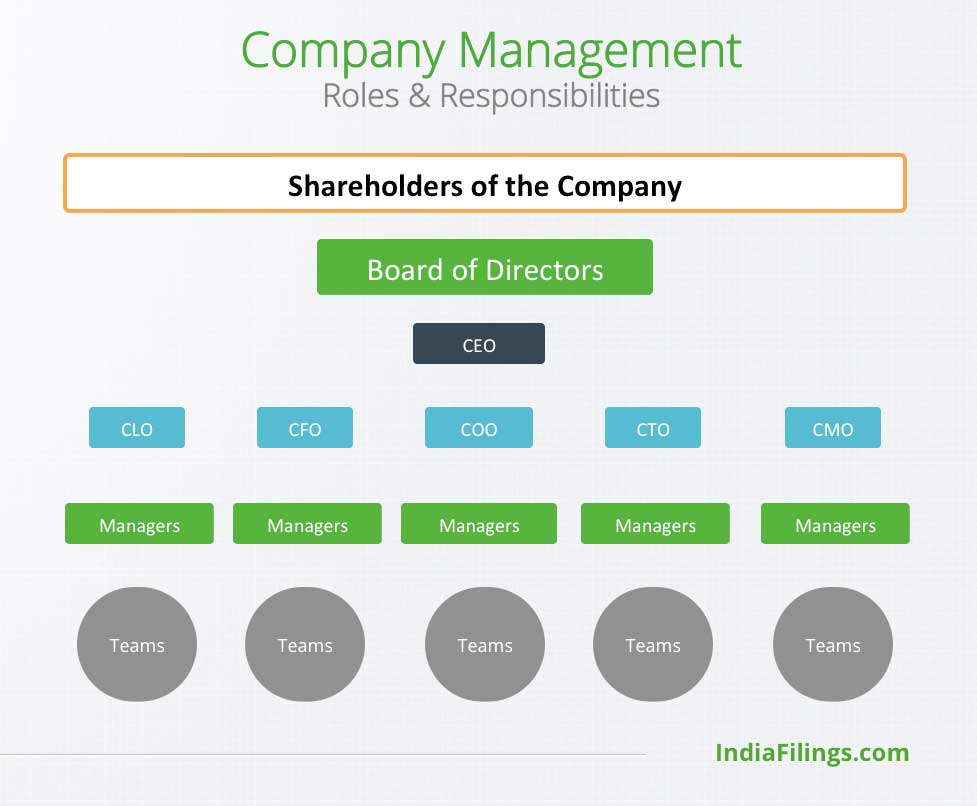 Last updated: November 21st, 2023 11:51 AM
Last updated: November 21st, 2023 11:51 AM
Company Management - Roles & Responsibilities
With reference to company management there are various stakeholders like directors, officers, managers and shareholders who guide a company towards the fulfilment of its business objectives. Management has been defined as “the process of planning, organizing, leading and controlling the efforts of company members and of using all company resources to achieve stated company goals.” Hence, the occupation of management is to maintain control over the company’s actions and performance, and simultaneously to lead, inspire and direct the people working in the company. This article studies organizational hierarchy in company management, role of shareholders, directors responsibilities and types of officers in company management.
[caption id="attachment_11660" align="aligncenter" width="977"] Company Management Structure
Company Management Structure
Role of Shareholders
Shareholders hold shares making them entitled to a share in the profits and the right to be represented by directors at board meetings. Directors are considered the elected representatives of shareholders. Executive directors are made responsible for continuous decision making in the business. Non-executive directors offer regular advice to the company but are not directly involved in the everyday company management. Know more about the types of Directors in a Company.Role of Directors
In company management the shareholders will select a board of directors to represent the company’s interests. The following conditions will be observed when selecting the director specifically:
- A minimum of three directors in the case of a Limited Company
- Two directors in the case of a Private Limited Company
- One director in the case of a One Person Company
A Managing Director will be selected who has general responsibility for managing the company’s affairs. The managing director with aid and assistance from other directors will select and employ senior managers or officers related to the domain of company management. Know more about the responsibilities of a Director in a Company.
Role of Officers
Officers of a company are appointed by the Board to Directors to hold various top level roles and responsibilities within the company. There is no statutory requirement for appointment of officers in a company. However, Directors are statutorily required to be appointed for all company by its shareholders. Some of the most popular types of officers of a company are:Chief Executive Officer
Chief Executive Officer (CEO) is the highest-ranking person in a company who is ultimately responsible for taking managerial decisions for the day to day operation of the company.Chief Operating Officer
Chief Operating Officer (COO) is a senior executive who oversees ongoing business operations within the company. COO reports to the CEO (Chief Executive Officer) and is usually second-in-command within the company.Chief Financial Officer
Chief financial officer (CFO) is a senior financial executive with responsibility for the financial affairs of a company. Typical responsibilities of the CFO include planning, budgeting, bookkeeping, accounting, setting up of internal controls, fund raising and other accounting/financial matters.Chief Technology Officer
Chief Technology Officer (CTO) is a senior technology executive within a company who oversees current technology development and maintenance aspects. Typical responsibilities of a CT include aligning of technology-related decisions with the company's goals, managing technology development, maintaining technology assets and create technology policies.Chief Marketing Officer
Chief Marketing Officer (CMO) is a senior marketing executive within a company who is involved in a wide variety of tasks like increasing revenue, improving brand image and managing marketing campaigns. CMO works directly with sales, marketing, and development departments to integrate marketing strategies in all divisions of the company.Chief Legal Officer
Chief Legal Officer (CLO) is a senior legal executive within a company who helps the company reduce its legal risks by advising the company and its employees or stakeholders on major legal and regulatory issues the company confronts and manage litigation risks.Role of Managers
Managers report to the Officers or to Presidents/Vice Presidents/Senior Managers within the division. Examples of responsibilities of managers in a company are as follows:- Accounts Manager - Maintenance of books of the company
- Recruitment Manager - Recruiting employees for the company and setting up of interviews
- Technology Manager - Development of a product or service
- Store Manager - Maintenance of stocks of the company
- Regional Managers - In the case of a company operating on a regional basis.
- Functional Managers - In the event of a company divided into different functions for example human resources, finance, sales, etc.,
- Departmental Managers - In the event of a company being divided into various departments for example retail, B2B, online.
- General Managers - In an office or factory may hire a general manager to whom functional managers report.
Resources Management
Various managers within the company are held responsible for management of the company's resources. Some of the top resources of a company that must be managed are:- People - Directing the company activities and taking care of the employees.
- Financial - The utilization of financial resources in the best possible method for the company to achieve profit and sales targets.
- Materials - Ensuring that material is utilized in the most dynamic way with minimal wastage.
- Machinery and Equipment - Utilization of suitable machinery and equipment, and ensuring that it is maintained, replaced and updated where essential.
- Buildings - Ensuring that premises are safe and are being utilized in the most superior possible manner.
- Technology - Ensuring that the company utilizes the most efficient information technologies.
Popular Post

In the digital age, the convenience of accessing important documents online has become a necessity...

The Atalji Janasnehi Kendra Project that has been launched by the Government of Karnataka...

The Indian Divorce Act governs divorce among the Christian couples in India. Divorce...

When an individual has more than a single PAN card, it may lead to that person being heavily penalised, or worse,...

Employees Provident Fund (PF) is social security and savings scheme for employee in India. Employers engaged...


